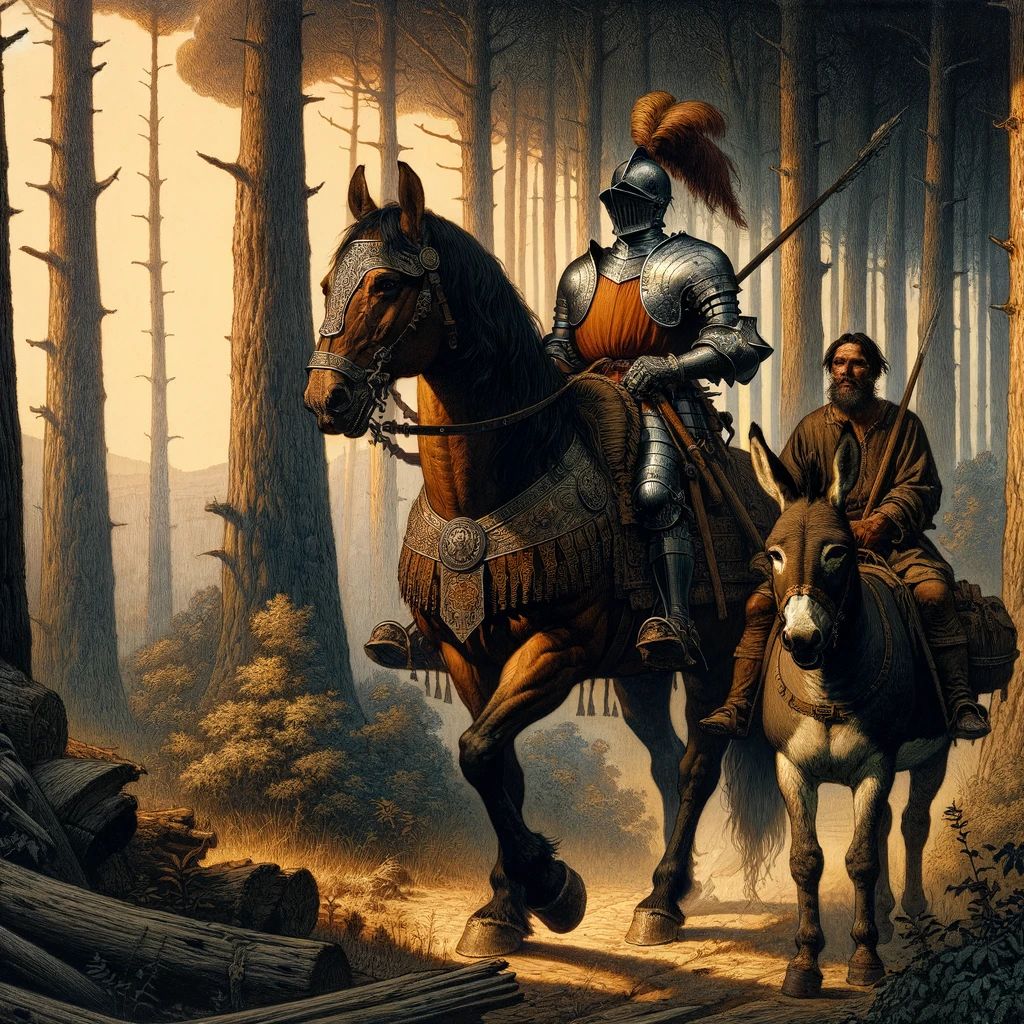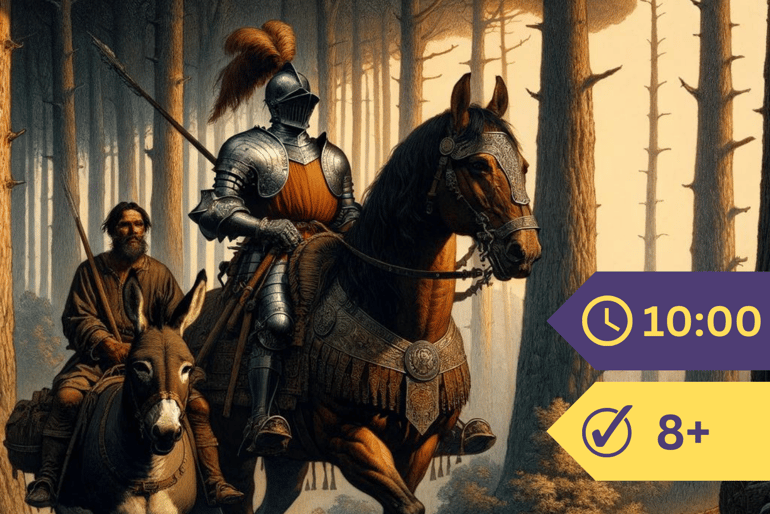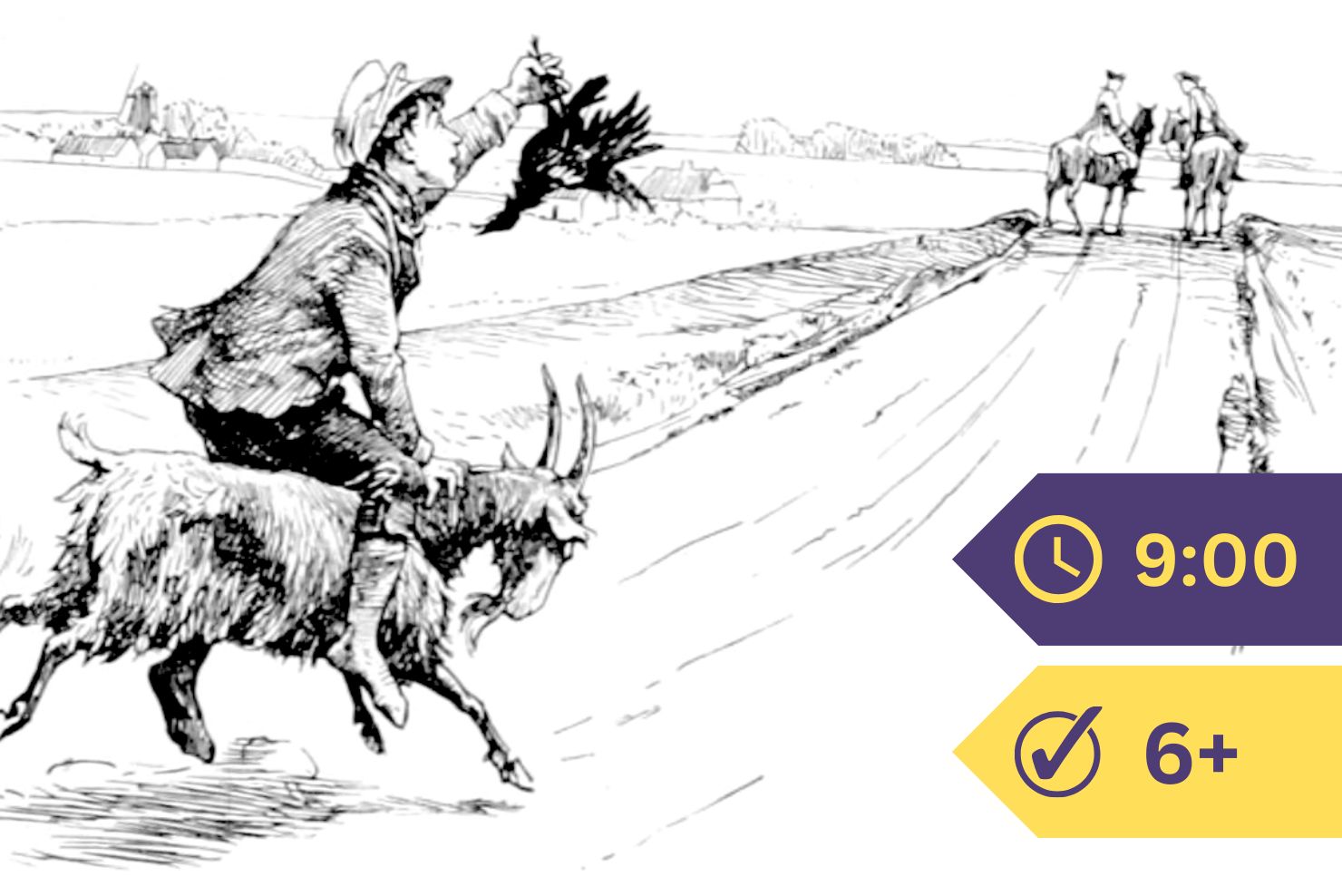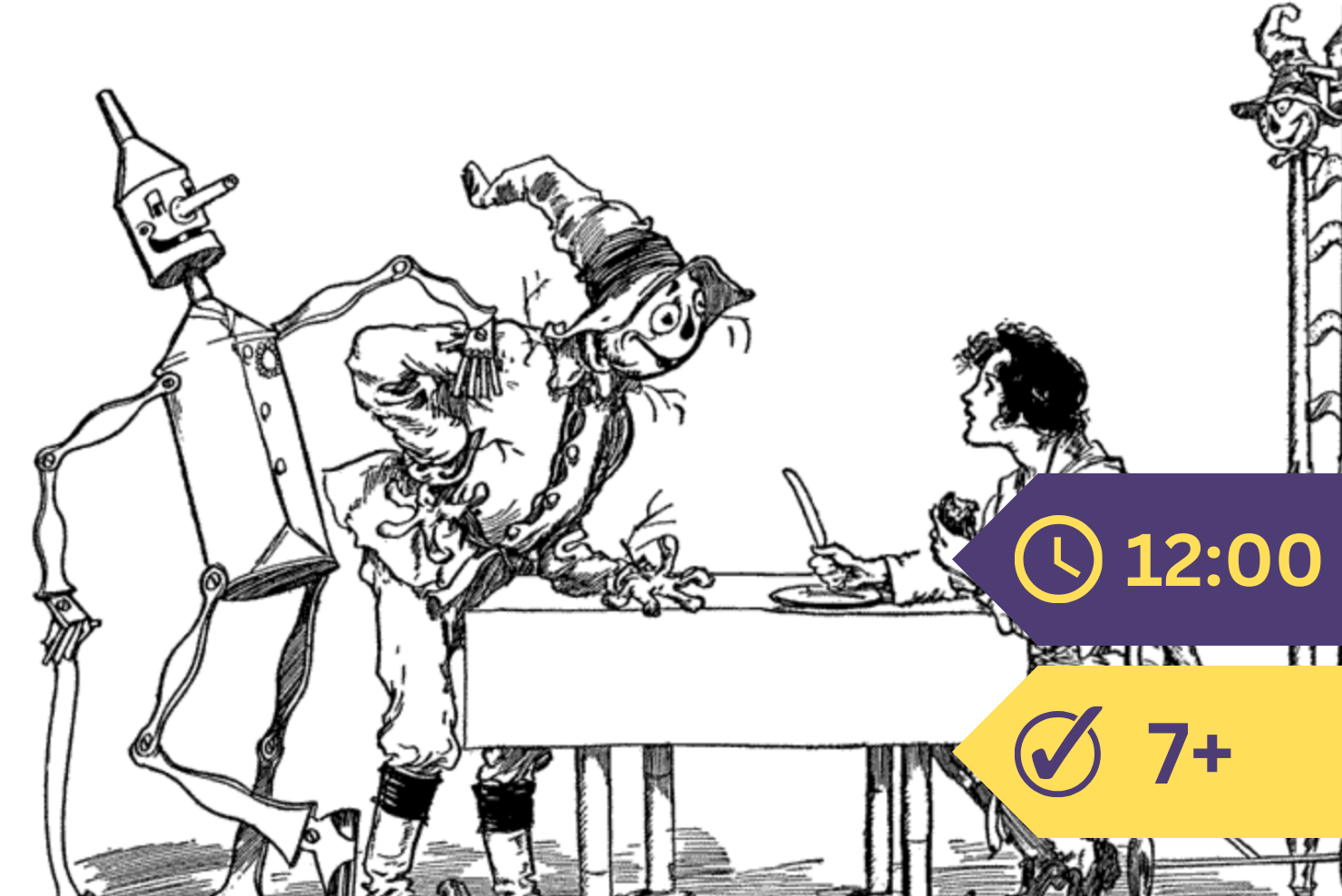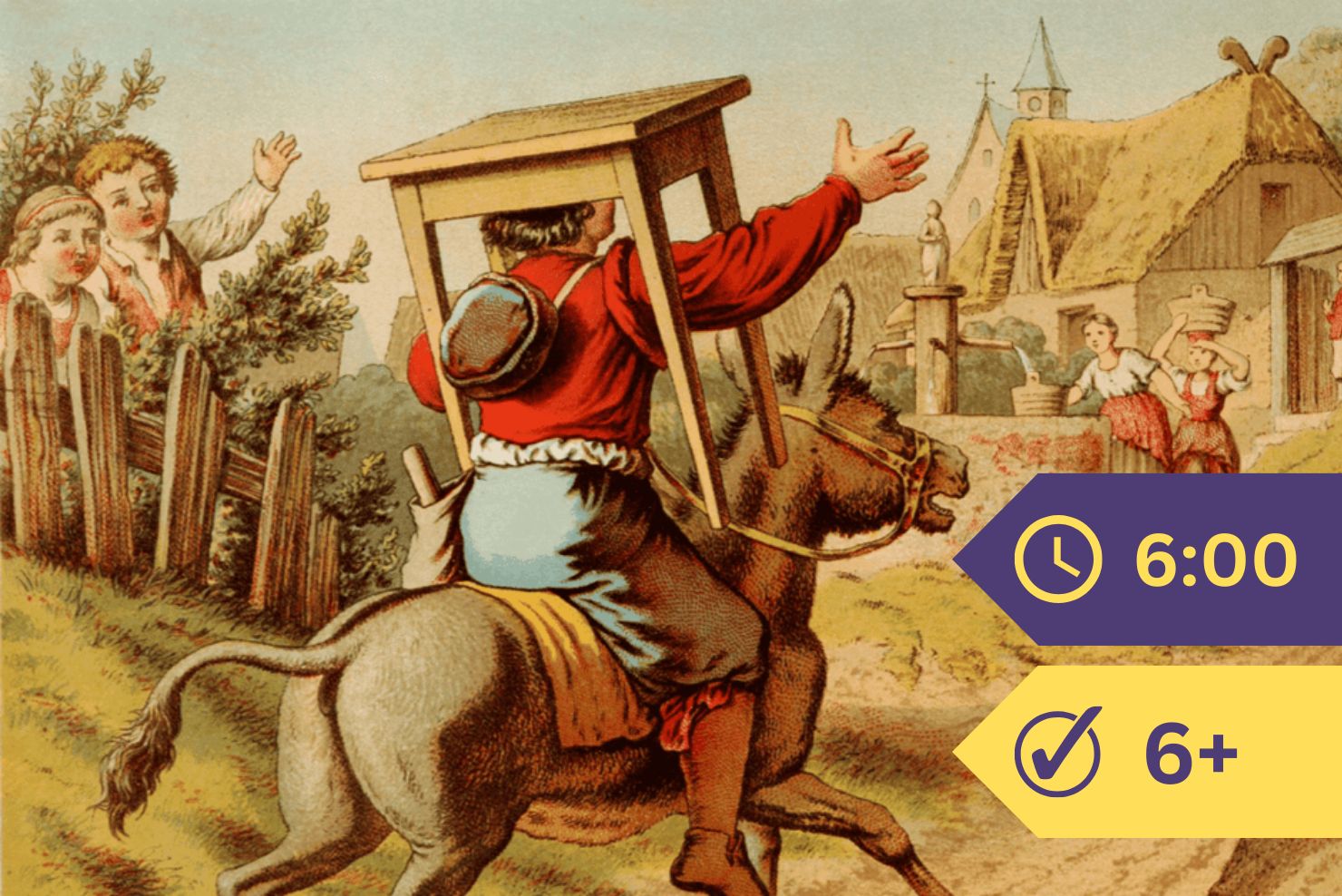Now whilst Sancho Panza lay groaning in his bed, Don Quixote, who, as we have said, felt somewhat eased and cured, made up his mind to set off in search of new adventures. And full of this desire he himself saddled Rozinante and put the pack-saddle on his squire’s beast, and helped Sancho to dress and to mount his ass. Then getting a-horseback he rode over to the corner of the inn and seized hold of a pike which stood there, to make it serve him instead of a lance.
All the people that were staying at the inn, some twenty in number, stood staring at him, and among these was the innkeeper’s daughter. Don Quixote kept turning his eyes towards her and sighing dolefully, which every one, or at least all who had seen him the night before, thought must be caused by the pain he was in from his bruises.
When they were both mounted and standing by the inn gate, he called to the innkeeper and said in a grave voice: “Many and great are the favours, sir constable, which I have received in this your castle, arid I shall remain deeply grateful for them all the days of my life. If I am able to repay you by avenging you on some proud miscreant that hath done you any wrong, know that it is my office to help the weak, to revenge the wronged, and to punish traitors. Ransack your memory, and if you find anything of this sort for me to do, you have but to utter it, and I promise you, by the Order of Knighthood which I have received, to procure you satisfaction to your heart’s content,”
“Sir knight,” replied the innkeeper with equal gravity, “I have no need that your worship should avenge me any wrong, for I know how to take what revenge I think good when an injury is done. All I want is that your worship should pay me the score you have run up this night in mine inn, both for the straw and barley of your two beasts, and your suppers and your beds.”
“This then is an inn?” exclaimed Don Quixote.
“Ay, that it is, and a very respectable one, too,” replied the innkeeper.
“All this time then I have been deceived,” said Don Quixote, “for in truth I thought it was a castle and no mean one. But since it is indeed an inn and no castle, all that can be done now is to ask you to forgive me any payment, for I cannot break the laws of knights-errant, of whom I know for certain that they never paid for lodging or anything else in the inns where they stayed. For the good entertainment that is given them is their due reward for the sufferings they endure, seeking adventures both day and night, winter and summer, a-foot and a-horseback, in thirst and hunger, in heat and cold, being exposed to all the storms of heaven and the hardships of earth.”
“All that is no business of mine,” retorted the innkeeper. “Pay me what you owe me, and keep your tales of knights-errant for those who want them. My business is to earn my living.”
“You are a fool and a saucy fellow,” said Don Quixote angrily, and, spurring Rozinante and brandishing his lance, he swept out of the inn yard before any one could stop him, and rode on a good distance without waiting to see if his squire was following.
The innkeeper, when he saw him go without paying, ran up to get his due from Sancho Panza, who also refused to pay, and said to him: “Sir, seeing I am squire to a knight-errant, the same rule and reason for not paying at inns and taverns hold as good for me as for my master.”
The innkeeper grew angry at these words, and threatened that if he did not pay speedily he would get it from him in a way he would not like.
Sancho replied that by the Order of Knighthood which his lord and master had received, he would not pay a penny though it cost him his life.
But his bad fortune so managed it, that there happened to be at the inn at this time four woolcombers of Segovia, and three needlemakers of Cordova, and two neighbours from Seville, all merry fellows, very mischievous and playsome. And as if they were all moved with one idea, they came up to Sancho, and pulling him down off his ass, one of them ran in for the innkeeper’s blanket, and they flung him into it. But looking up and seeing that the ceiling was somewhat lower than they needed for their business, they determined to go out into the yard, which had no roof but the sky, and there placing Sancho in the middle of the blanket, they began to toss him aloft and to make sport with him by throwing him up and down. The outcries of the miserable be-tossed squire were so many and so loud that they reached the ears of his master, who, standing awhile to listen what it was, believed that some new adventure was at hand, until he clearly recognised the shrieks to come from poor Sancho. Immediately turning his horse, he rode back at a gallop to the inn gate, and finding it closed, rode round the wall to see if he could find any place at which he might enter. But he scarcely got to the wall of the inn yard, which was not very high, when he beheld the wicked sport they were making with his squire. He saw him go up and down with such grace and agility, that, had his anger allowed him, I make no doubt he would have burst with laughter. He tried to climb the wall from his horse, but he was so bruised and broken that he could by no means alight from his saddle, and therefore from on top of his horse he used such terrible threats against those that were tossing Sancho that one could not set them down in writing.
But in spite of his reproaches they did not cease from their laughter or labour, nor did the flying Sancho stop his lamentations, mingled now with threats and now with prayers. Thus they carried on their merry game, until at last from sheer weariness they stopped and let him be. And then they brought him his ass, and, helping him to mount it, wrapped him in his coat, and the kind-hearted Maritornes, seeing him so exhausted, gave him a pitcher of water, which, that it might be the cooler, she fetched from the well.
Just as he was going to drink he heard his master’s voice calling to him, saying: “Son Sancho, drink not water, drink it not, my son, for it will kill thee. Behold, here I have that most holy balsam,”—and he showed him the can of liquor,—”two drops of which if thou drinkest thou wilt undoubtedly be cured.”
At these words Sancho shuddered, and replied to his master: “You forget surely that I am no knight, or else you do not remember the pains I suffered last evening. Keep your liquor to yourself, and let me be in peace.”
At the conclusion of this speech he began to drink, but finding it was only water he would not taste it, and called for wine, which Maritornes very kindly fetched for him, and likewise paid for it out of her own purse.
As soon as Sancho had finished drinking, he stuck his heels into his ass, and the inn gate being thrown wide open he rode out, highly pleased at having paid for nothing, even at the price of a tossing. The innkeeper, however, had kept his wallet, but Sancho was so distracted when he departed that he never missed it.
When Sancho reached his master, he was almost too jaded and faint to ride his beast. Don Quixote, seeing him in this plight, said to him: “Now I am certain that yon castle or inn is without doubt enchanted, for those who made sport with thee so cruelly, what else could they be but phantoms, and beings of another world? And I am the more sure of this, because when I was by the wall of the inn yard I was not able to mount it, or to alight from Rozinante, and therefore I must have been enchanted. For if I could have moved, I would have avenged thee in a way to make those scoundrels remember the jest for ever, even although to do it I should have had to disobey the rules of knighthood.”
“So would I also have avenged myself,” said Sancho, “knight or no knight, but I could not. And yet I believe that those who amused themselves with me were no phantoms or enchanted beings, but men of flesh and bones as we are, for one was called Pedro, and another Tenorio, and the innkeeper called a third Juan. But what I make out of all this, is that those adventures which we go in search of, will bring us at last so many misadventures that we shall not know our right foot from our left. And the best thing for us to do, in my humble opinion, is to return us again to our village and look after our own affairs, and not go jumping, as the saying is, ‘out of the frying-pan into the fire.'”
“How little dost thou know of knighthood, friend Sancho,” replied Don Quixote. “Peace, and have patience, for a day will come when thou shalt see with thine own eyes how fine a thing it is to follow this calling. What pleasure can equal that of winning a battle or triumphing over an enemy?”
“I cannot tell,” answered Sancho; “but this I know, that since we are knights-errant, we have never won any battle, unless it was that with the Biscayan, and even then your worship lost half an ear. And ever after that time it has been nothing but cudgels and more cudgels, blows and more blows,—I getting the tossing in the blanket to boot. And all this happens to me from enchanted people on whom I cannot take vengeance.”
“That grieves me,” replied Don Quixote; “but who knows what may happen? Fortune may bring me a sword like that of Amadis, which did not only cut like a razor, but there was no armour however strong or enchanted which could stand before it.”
“It will be like my luck,” said Sancho, “that when your worship finds such a sword it will, like the balsam, be of use only to those who are knights, whilst poor squires will still have to sup sorrow.”
“Fear not that, Sancho,” replied his master; and he rode ahead, his mind full of adventures, followed at a little distance by his unhappy squire.
